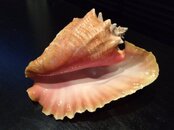- Messages
- 16,407
- Reaction score
- 5,219
- # of dives
- 1000 - 2499
Thanks Wookie. Only Pacific Triton Trumpets (Charonia tritonis) eat Crown of Thorns, because Crown of Thorns is not in Atlantic Waters. I have several Atlantic Triton Trumpets (Charonia veriegata) in my collection. But admit, I would take a Pacific one if I ever had the dinero to go there.
We could argue forever (and in 2008....), but when you each conch, you're killing it anyway. If we took 50% of all the deep sea fish caught since 1900 and dumped them into a field in the middle of Kansas, the world fish population would still be somewhat GREAT.
I appreciate you saying "to each his own".
We could argue forever (and in 2008....), but when you each conch, you're killing it anyway. If we took 50% of all the deep sea fish caught since 1900 and dumped them into a field in the middle of Kansas, the world fish population would still be somewhat GREAT.
I appreciate you saying "to each his own".





